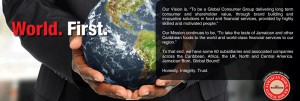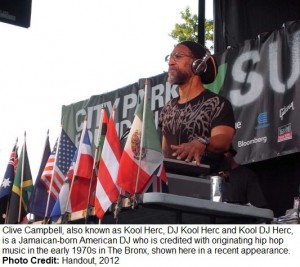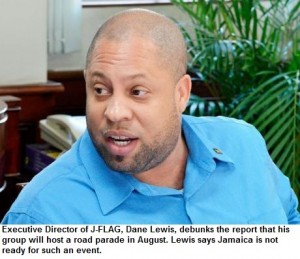Go Lean Commentary
The accusation is that the Caribbean – as a region, a people, and a culture – features a parasite status rather than the preferred protégé status. This would mean we only glean the economic activity left over from the other “host” countries; we would also consume the offerings and trends of these more advanced economy countries, rather than dictate our own trends.
This accusation … is mostly true!
But alas, there is a spark of hope in our Caribbean region. There are a number of corporate entities that do dictate trends in the region and throughout the world. The book Go Lean…Caribbean addressed this trend and identified one such company, Jamaica-based ATL Group, the owners of Sandals/Beaches Resorts, an Office Equipment business, Honda automobile dealerships and the media company behind The Jamaica Observer newspaper. But now, we consider another one, this time we focus on the transnational corporation, GraceKennedy Group of Companies who operate in the food and financial sectors.
But first, we must consider the definition of transnationalism:
Transnationalism as an economic process involves the global reorganization of the production process, in which various stages of the production of any product can occur in various countries, typically with the aim of minimizing costs. Economic transnationalism, commonly known as Globalization, was spurred in the latter half of the 20th century by the development of the internet and wireless communication, as well as the reduction in global transportation costs caused by containerization. Multinational corporations could be seen as a form of transnationalism, in that they seek to minimize costs, and hence maximize profits, by organizing their operations in the most efficient means possible irrespective of political boundaries.
A multinational corporation is an organization that owns or controls production of goods or services in one or more countries other than their home country.[2]
What Drives Transnationalism?
Some argue that the main driver of transnationalism has been the development of technologies that have made transportation and communication more accessible and affordable, thus dramatically changing the relationship between people and places. It is now possible for immigrants to maintain closer and more frequent contact with their home societies than ever before. However, the integration of international migrations to the demographic future of many developed countries is another important driver for transnationalism. Beyond simply filling a demand for low-wage workers, migration also fills the demographic gaps created by declining natural populations in most industrialized countries. Today, migration accounts for 3/5 of population growth on western countries as a whole. And this trend shows no sign of slowing down. Moreover, global political transformations and new international legal regimes have weakened the state as the only legitimate source of rights. Decolonization, coupled with the fall of communism and the ascendance of human rights, have forced states to take account of persons qua persons, rather than persons qua citizens.Immigrant Transnational Activities – When immigrants engage in transnational activities, they create “social fields” that link their original country with their new country or countries of residence. These social fields are the product of a series of interconnected and overlapping economic, political, and socio-cultural activities. As for economic transnational activities, these include business investments in home countries and monetary remittances from source countries. The Inter-American Development Bank (IDB) estimates that in 2006 immigrants living in developed countries sent home the equivalent of $300 billion in remittances, an amount more than double the level of international aid. This intense influx of resources may mean that for some nations development prospects become inextricably linked- if not dependent upon – the economic activities of their respective Diasporas.
Source: Retrieved September 5, 2016 from: https://en.wikipedia.org/wiki/Transnationalism
The GraceKennedy Group of Companies, started in 1922, is based in Kingston, Jamaica, but they are one of the Caribbean “largest and most dynamic corporate entities” in the region. Though they are based in Jamaica, they generate a lot of their global revenue – from food services and financial services – from the rest of the globe. They depend on globalization – economic transnationalism – in order to be an ongoing concern. Their marketing slogan is “Jamaican born; global bound”. They own 60 subsidiaries – see partial list in the Appendix below – and affiliated companies across the Caribbean, Africa, UK, North and Central America; they are a model of a transnational corporation. See VIDEO here:
VIDEO – GraceKennedy at 90 – https://youtu.be/okDBEAdC6LY
Published on Feb 10, 2012 – Jamaican conglomerate Grace Kennedy is celebrating 90 years of existence. The Gleaner recently toured its Harbour Street corporate office and learnt what drives the company’s success.
The history of this company traces a parallel arch of change in the Caribbean region for the 20th Century:
| Regional Change Dynamics | Year | Company Dynamic Changes |
| European Colonialism | 1922 | Company formed to facilitate importation / local distribution |
| Decolonization | 1952 | Nation-building rather than mother-country dependence |
| Emigration from Homeland / Diaspora | 1959 | Export Caribbean home products to the world |
| Embrace of regionalism | 1962 | Incorporating in other Caribbean member-states |
| Shift to Service Economy | 1990 | Financial Services focus on Remittance |
GraceKennedy has expanded and diversified over the years,[2] changing from a privately owned enterprise to a public company listed on the stock exchanges of Jamaica, Trinidad, Barbados and the Eastern Caribbean.
The company does not only appeal to the Jamaican community (domestic or Diaspora) or not only to the Anglo-speaking Caribbean; they also strategize for the Hispanic communities. In that vein, as reported in the foregoing VIDEO, in 2014  GraceKennedy acquired La Fe Foods Inc., a top Hispanic consumer foods company – especially dominant in the frozen food category – in the US.
GraceKennedy acquired La Fe Foods Inc., a top Hispanic consumer foods company – especially dominant in the frozen food category – in the US.
This transnational corporation aligns with the vision for societal elevation in the book Go Lean … Caribbean. These two visions actually parallel:
- GraceKennedy – To be a Global Consumer Group delivering long term consumer and shareholder value, through brand building and innovative solutions in food and financial services, provided by highly skilled and motivated people.
- Go Lean – To integrate and unify the Caribbean region into a Single Market Economy, enabling the homeland to be the best address on the planet, inviting our young people to participate in the effort to make our home the best place to live, work and play in the future. – Page 45.
The Go Lean book serves as a roadmap for the introduction and implementation of the technocratic Caribbean Union Trade Federation (CU). This is a call for confederating, collaborating and convening the 30 member-states of the region – despite the language or colonial legacy – into a Single Market; and for one federal governmental entity to optimize the economic, security and governing endeavors. This would also mean optimization of the food supply and financial services landscape. The Go Lean/CU roadmap creates the atmosphere for many more transnational corporations – homegrown and foreign – to emerge and thrive. This is part-and-parcel of the prime directives (3) of the CU/Go Lean roadmap:
- Optimization of the economic engines – facilitating the growth in corporate citizens – in order to grow the regional economy to $800 Billion & create 2.2 million new jobs.
- Establishment of a security apparatus to protect the resultant economic engines.
- Improvement of Caribbean governance to support these economic engines, reflecting a separation-of-powers between CU agencies and member-state governments.
The CU seeks to facilitate better mastery of the advanced fields of economics by incentivizing, incubating and fostering entrepreneurial efforts, small-to-medium-businesses (SMB) and large multi-national corporations. This is how to create new jobs; jobs are not created by governments, but yet, the governmental administrations can implement the right climate to spur industrial and corporate growth. The job-creation solutions for the Caribbean, are not so much dependent on a specific government, but rather good corporate guidance.
A goal of the Go Lean/CU roadmap is to attract more transnational corporations, to establish a footprint in the Caribbean. How? Why? Why will they come to the Caribbean under the Go Lean/CU regime when they will not come now under the status quo? One answer is the structure of Self-Governing Entities (SGE), and Exclusive Economic Zones (EEZ). SGE refers to dedicated, bordered grounds that are ideal for corporate campuses, research laboratories, industrial bases (like shipyards, factory plants). The SGE structure will require a hybrid governance involving the CU federal agencies and local administrators influence– at the start-up.
The book Go Lean … Caribbean asserts that SGE’s and the EEZ can be strategic, tactical and operationally efficient for elevating Caribbean society – creating jobs. These points are pronounced early in the book with this Declaration of Interdependence (Pages 11 thru 14), with these statements:
v. Whereas the natural formation of our landmass and coastlines entail a large portion of waterscapes, the reality of management of our interior calls for extended oversight of the waterways between the islands. The internationally accepted 12-mile limits for national borders must be extended by International Tribunals to encompass the areas in between islands. The individual states must maintain their 12-mile borders while the sovereignty of this expanded area, the Exclusive Economic Zone, must be vested in the accedence of this Federation.
xxiv. Whereas a free market economy can be induced and spurred for continuous progress, the Federation must install the controls to better manage aspects of the economy: jobs, inflation, savings rate, investments and other economic principles. Thereby attracting direct foreign investment because of the stability and vibrancy of our economy.
xxv. Whereas the legacy of international democracies had been imperiled due to a global financial crisis, the structure of the Federation must allow for financial stability and assurance of the Federation’s institutions. To mandate the economic vibrancy of the region, monetary and fiscal controls and policies must be incorporated as proactive and reactive measures. These measures must address threats against the financial integrity of the Federation and of the member-states.
xxvi. Whereas the Caribbean region must have new jobs to empower the engines of the economy and create the income sources for prosperity, and encourage the next generation to forge their dreams right at home, the Federation must therefore foster the development of new industries, like that of ship-building, automobile manufacturing, prefabricated housing, frozen foods, pipelines, call centers, and the prison industrial complex. In addition, the Federation must invigorate the enterprises related to existing industries tourism, fisheries and lotteries – impacting the region with more jobs.
xxx. Whereas the effects of globalization can be felt in every aspect of Caribbean life, from the acquisition of food and clothing, to the ubiquity of ICT, the region cannot only consume, it is imperative that our lands also produce and add to the international community, even if doing so requires some sacrifice and subsidy.
Though there is a need for more jobs, there is a legitimate fear to inviting more corporations. There are real-life experiences and stories of abuse in mono-industrial communities – Company Towns. Abuse by the “super-rich” is implied in the old adage: “golden rule is he who has the gold makes the rule”. But the Go Lean roadmap is designed to mitigate abuses of plutocracies. This is the advantage of the SGE structure; it allows for better promotion, oversight, and governance for transnational corporate expressions. These SGE’s would be regulated solely by the technocratic CU; there would be features like advanced monitoring (intelligence gathering) and embedded protections for whistleblowers.
 The Go Lean roadmap identifies 40,000 new direct jobs tied to SGE’s; plus more tied to industrial activities directly related to the business activities that aligns with GraceKennedy business model, such as 30,000 new direct jobs in the food supply industries and 2,000 direct jobs in the frozen foods industry. These job-creation empowerments will impact every aspect of Caribbean life throughout the Caribbean.
The Go Lean roadmap identifies 40,000 new direct jobs tied to SGE’s; plus more tied to industrial activities directly related to the business activities that aligns with GraceKennedy business model, such as 30,000 new direct jobs in the food supply industries and 2,000 direct jobs in the frozen foods industry. These job-creation empowerments will impact every aspect of Caribbean life throughout the Caribbean.
The Go Lean book details a series of community ethos, strategies, tactics, implementations and advocacies to foster industrial developments and SGE’s. The following list applies:
| Community Ethos – Economic Principles – Economic Systems Influence Individual Choices | Page 21 |
| Community Ethos – Economic Principles – Voluntary Trade Creates Wealth | Page 21 |
| Community Ethos – Lean Operations | Page 24 |
| Community Ethos – Return on Investments | Page 24 |
| Community Ethos – Cooperatives | Page 25 |
| Community Ethos – Ways to Impact the Future | Page 26 |
| Community Ethos – Ways to Impact the Greater Good | Page 32 |
| Strategy – Vision – Confederate to form a Single Market | Page 45 |
| Strategy – Mission – Build and foster local economic engines | Page 45 |
| Strategy – Mission – Exploit the benefits and opportunities of globalization | Page 46 |
| Strategy – Mission – Keep the next generation at home | Page 46 |
| Tactical – Fostering a Technocracy | Page 64 |
| Tactical – Separation of Powers – Commerce Department – Interstate Commerce Administration | Page 79 |
| Tactical – Separation of Powers – Department of Agriculture | Page 88 |
| Anecdote – “Lean” in Government | Page 93 |
| Implementation – Foreign Policy Initiatives at Start-up | Page 102 |
| Implementation – Start-up Benefits from the EEZ | Page 104 |
| Implementation – Steps to Implement Self-Governing Entities | Page 105 |
| Advocacy – 10 Big Ideas – Single Market Leverage | Page 127 |
| Advocacy – Ways to Improve Interstate Commerce | Page 129 |
| Advocacy – Ways to Better Manage Food Consumption – Export: Help Find Foreign Markets | Page 156 |
| Advocacy – Ways to Better Manage the Social Contract | Page 170 |
| Advocacy – Ways to Foster Cooperatives – Common for Agricultural Structures | Page 176 |
| Advocacy – Ways to Better Manage Natural Resources – Optimization of Pastoral Lands | Page 183 |
| Anecdote # 18 – Caribbean Industrialist: Sandals’ Butch Stewart | Page 189 |
| Advocacy – Reforms for Banking Regulations | Page 199 |
| Advocacy – Ways to Impact Wall Street – Expansion of local Securities markets | Page 200 |
| Advocacy – Ways to Impact Main Street | Page 201 |
| Advocacy – Ways to Develop a Frozen Foods Industry | Page 208 |
| Advocacy – Ways to Improve Fisheries – Canaries & Refrigerated Warehouse Cooperatives | Page 210 |
| Advocacy – Ways to Impact the Diaspora | Page 217 |
| Advocacy – Ways to Impact Rural Living – SGE Strategic Locations | Page 235 |
| Advocacy – Ways to Re-boot Jamaica | Page 239 |
This commentary asserts that industrial development is hard-work. It is difficult now to get Direct Foreign Investors to consider individual Caribbean member-states, but with this new approach of a regional Single Market, a leveraged Caribbean – 42 million people – can be more attractive, appealing and inviting. Despite the appeal, executing this Go Lean/CU roadmap will still be hard; the book describes the effort as heavy-lifting.
Many of these heavy-lifting issues have been previously identified and detailed in prior Go Lean blog-commentaries. See this sample list:
| https://goleancaribbean.com/blog/?p=8379 | The Need for Technocratic Regulation of the SGE’s |
| https://goleancaribbean.com/blog/?p=5921 | Socio-Economic Change: Impact Analysis of SGE’s |
| https://goleancaribbean.com/blog/?p=4037 | How to Train Your ‘Dragon’ – Direct Foreign Investors |
| https://goleancaribbean.com/blog/?p=3473 | Haiti’s Example of Success with an SGE: CaracolIndustrial Park |
| https://goleancaribbean.com/blog/?p=2750 | Disney World – Role Model for Self-Governing Entities |
This Go Lean movement, fostering a new Caribbean business climate, hereby applauds the corporate stakeholders at the GraceKennedy Group of Companies. We invite them to partner with us to make the Caribbean region a better place to live, work and play. But there is the need for a cautionary warning to them: the change that is coming has “plus & minus” ramifications for their business model.
There are aspects of the Go Lean roadmap that will not be good for some of GraceKennedy’s business model, remittances in particular. (While a GraceKennedy subsidiary is the regional partner representing Western Union in the Caribbean, the Go Lean book – Page 270 – introduces new electronic payment schemes that will lessen the need to pay for money transfers). It is clearly apparent in the Go Lean book, that change is not always good; sometimes it brings unintentional consequences. So if we know change is happening, it is best to get ahead of it. This point was stated poignantly at Page 252:
Opportunities abound; even if there is only little commerce to exploit now, there is opportunity enough in the preparation for the coming change. So act now! Get moving to that place, the “corner” of preparation and opportunity.
With the execution of this Go Lean roadmap, the Caribbean region sends a message to the business world: Change is afoot. There will be new partnerships and collaborations for corporate stakeholders. A message is sent to the Caribbean people as well: there are solutions to these complex problems befalling our society. Whereas the Caribbean may have been a parasite before, now we can function in the role of a protégé.
Like all parasites, their healthy disposition depends on a healthy disposition of the hosts. The Caribbean has been in crisis; therefore the parasitic people have fled – the Caribbean’s “brain drain” and Diaspora has grown as a result – not good. The successful execution of this roadmap will affect this disposition as well. We will and must do better! Optimizing the economic, security and governing engines in the region will lower the abandonment rate. This will also constitute change – good change – for the region.
The Caribbean homeland will then be a better place to compete globally and present more favorable options for our youth to stay home in the region.
Now is the time for all Caribbean stakeholders – corporate citizens included – to lean-in for the optimizations and empowerments described in the book Go Lean … Caribbean. This roadmap is conceivable, believable and achievable. 🙂
Download the free e-Book of Go Lean … Caribbean – now!
—————–
Appendix – List of Subsidiaries: GraceKennedy Group of Companies
- Banking and Financial services
- First Global Bank Limited
- First Global Financial Services Limited
- FG Funds Management (Cayman) Limited
- First Global Trinidad & Tobago Limited (formerly One1 Financial Limited)
- Signia Financial Group Incorporated
- Remittances
- GraceKennedy Remittance Services Limited
- GraceKennedy Remittance Services (United States) Incorporated
- GraceKennedy Remittance Services (Trinidad & Tobago) Limited
- GraceKennedy Remittance Services (Guyana) Limited
- Insurance Life and General
- Allied Insurance Brokers Limited
- EC Global Insurance Company Limited
- First Global Insurance Brokers Limited
- Jamaica International Insurance Company Limited
- Trident Insurance Company Limited
- Manufacturing, retail and distribution
- Dairy Industries (Jamaica) Limited
- Grace Foods and Services Company
- GraceKennedy (Belize) Limited
- Grace Food Processors Limited
- Grace Food Processors (Canning) Limited
- GraceKennedy (United States) Incorporated
- Grace Foods International Limited
- National Processors Division
- World Brands Services Limited
- Hi-Lo Food Stores (Jamaica) Limited
- GK Foods (United Kingdom) Limited
- GraceKennedy (Ontario) Incorporated
- Hardware & Lumber Limited




































